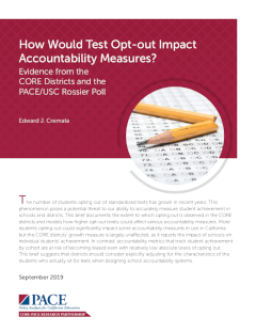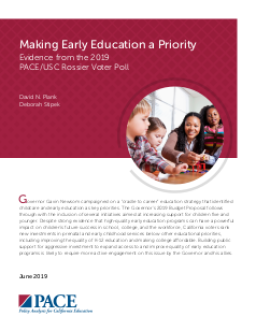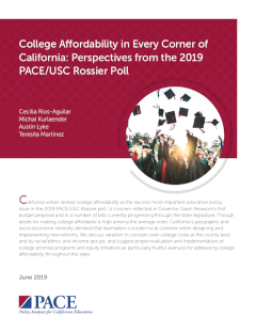Summary
The increase in students opting out of standardized tests is a threat to accurately measuring student achievement. This brief examines the effects of opting out in the CORE districts and models how it could affect accountability measures. More opt-outs could significantly impact some metrics, but the growth measure is largely unaffected. Metrics tracking achievement by cohort are at risk of bias, even with low levels of opting out. Adjusting for characteristics of students who take the tests could be a solution.
Summary
Governor Newsom has proposed initiatives to support children under 5, but California voters prioritize K-12 education and college affordability over early education. Despite evidence that high-quality early education has a powerful impact on children’s future success, more active engagement by the Governor and his allies may be necessary to build public support for expanding access and improving the quality of early education programs.
Summary
College affordability was ranked as the second most important education policy issue in the 2019 PACE/USC Rossier poll. Governor Newsom’s budget proposal and several bills in the state legislature reflect this concern. The diverse geography and socioeconomic status in CA demand local context consideration for designing effective reforms. Variation in concern over college costs is discussed by county and income and racial/ethnic groups. Proper evaluation and implementation of college promise programs and equity initiatives are suggested as fruitful avenues for addressing college affordability.
Summary
This report updates previous research on California's Local Control Funding Formula (LCFF) using a 2019 poll of California voters. Despite increased awareness, over half of voters are unfamiliar with LCFF. Support for the policy remains high but has decreased. Participation in LCFF engagement has increased but remains low, particularly among low-income voters. Low-income communities may not be meaningfully engaged in LCFF decision-making.
Summary
This brief analyzes the 2018 update of the California School Dashboard, examining improvements and areas for continued enhancement. Using data from the 2019 PACE/USC Rossier poll, the author characterizes use of and support for the Dashboard, finding low use, equity gaps, but high support and preference for the new Dashboard.




